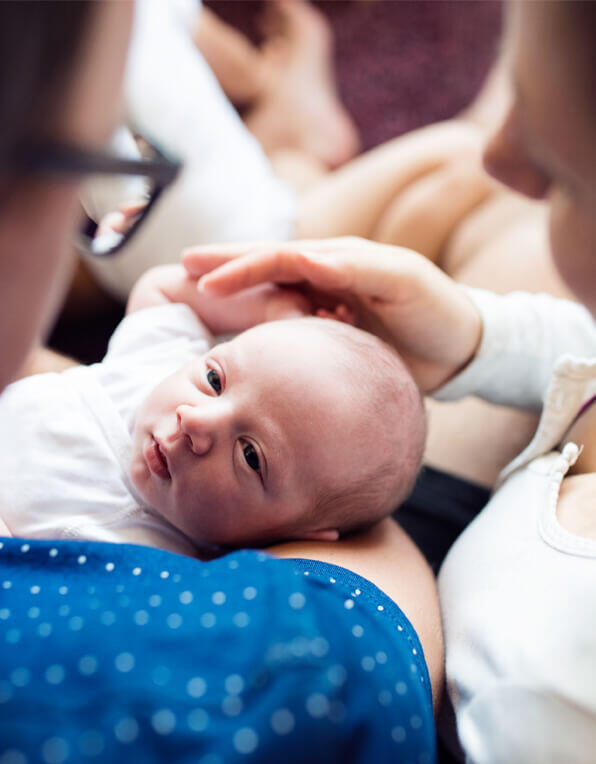Your Journey
Pregnancy to Birth
Your journey from conception to birth is one of the most unique and wonderful periods of your life, and every woman has a totally individual experience. On this page, you’ll find some information on how your baby develops throughout your pregnancy and some information on recommended scans and tests to get at certain times.
Don’t be too worried if your own pregnancy doesn’t progress at exactly the same rate – every woman and every pregnancy is a little different.

First Trimester (1-13 weeks)
In the first few weeks, your baby is just starting to grow. It’s still microscopic at this point, and most women don’t even realise they might be pregnant until week 6 or later. The embryo is curved in shape and has a tail, which makes it look a little like a tiny tadpole.
At 8 weeks, your baby is now called a foetus, which means ‘offspring’. Its legs are starting to get longer, and its spinal cord and nervous system are developing.
At week 12, the foetus is fully formed. Its organs, muscles, and bones are in place. Your baby is starting to move quite a bit, but it’s too small for you to feel.
Vaccinations
Flu shot – since your risk of developing complications from the flu is higher during pregnancy, the government provides subsidised flu shots to pregnant women. The Flu vaccine can be given at any time during pregnancy and is usually available seasonally – this could end up being during your first trimester.

Recommended Scans & Check-ups
Home pregnancy test – most will work from around week 4, but some may work earlier
Visit your GP or midwife (as soon as possible!) – your GP or midwife will be able to provide guidance for your pregnancy and help you access other scans, tests, and resources. Your GP will usually order the basic blood tests for your pregnancy, and you can ask them for a referral to Toowoomba Obstetrics and Gynaecology.
Monthly appointments with Dr Homar (first 28 weeks) – if you haven’t had your dating scan before your first appointment, Dr Homar will perform it. He will also provide a 3D/4D scan of your baby at a later date.
Dating scan (8 weeks) – This lets you know how far along in your pregnancy you are, and can help determine a due date.
Blood test (9-12 weeks) – this can be used to check your blood sugar, hormones, iron levels, or to look for infections which could harm you or your baby.
Non-invasive prenatal test (NIPT) (10 weeks) – this is a new, highly sensitive test that can identify Down syndrome or other abnormalities.
Translucency scan (11-13 weeks) – this ultrasound looks at the thickness of your baby’s nuchal fold (the fold of the skin at the back of their neck) for signs of a chromosomal abnormality, such as Down syndrome. The scan is combined with other screening results to give you an estimate of risk. Further investigation with chorionic villus sampling or amniocentesis might be recommended depending on the results.
Chorionic villus sampling (CVS) (11-13 weeks) – this might be recommended by your doctor if your baby has a high risk of inheriting a serious generic condition.
Routine appointment (12 weeks) - All the screening test results are discussed here.
Second Trimester (14-26 weeks)
By 15 weeks your baby can start to hear noises, including the sound of your voice and heart. It can also start to recognise light. It already has fingerprints, it weighs about 70 grams, and its body is covered in fine, soft hair called lunago.
At 20 weeks, you’re halfway through your pregnancy! You may start to feel your baby move.
At 24 weeks, your baby’s lungs and vital organs are mostly developed. From this point, your baby starts to have a chance of survival if it is born early.
By the end of your second trimester, your baby is regularly passing urine and amniotic fluid. It weighs about 1kg, and is perfectly formed. Your partner may be able to hear the baby's heart if they put their head on your stomach, but it can be difficult to find the right place to listen.
Recommended scans & check-ups
Routine:
Ultrasound (18-20 weeks) – This scan provides a detailed morphology of your baby and can usually be used to determine the gender! Make sure to ask your sonographer if you would like to know.
Urine screening (from 24 weeks) – this checks for the presence of protein and sugar in the urine, which could indicate gestational diabetes.
If recommended:
Amniocentesis testing (14-20 weeks) – this involves taking a sample of your amniotic fluid to test for a number of conditions. It may be recommended if your baby has higher than normal chances of developing a chromosome abnormality or other problem.
Maternal serum testing (14-20 weeks) – this is a blood test which can be used to check for some abnormalities in your baby.

Vaccinations
Whooping cough (pertussis vaccine) (20-34 weeks) – getting your pertussis vaccine at this time lets the antibodies pass from you to your baby.
Influenza vaccine - Since your risk of developing complications from the flu is higher during pregnancy, the government provides subsidised flu shots to pregnant women. The Flu vaccine can be given at any time during pregnancy, and is usually available seasonally.
Third Trimester (27-40 weeks)
At 27 weeks, your baby is probably becoming more and more active! You’ll probably feel lots of movement, and its heart beats at around 140 beats per minute.
By 32 weeks, your baby is usually lying with their head pointing down, ready to be born. Its brain and nervous system are almost fully developed, and most of its bones are beginning to harden. Your baby’s skull bones will remain soft until after birth to make the journey through the birth canal easier.
At about 36 weeks, your baby can breathe on its own. Its lungs are fully formed, and it’s almost ready to come out! It has also learned to suckle by this point, so it will be able to feed when it comes out.
At 37 weeks, your baby is just about ready to come into the world! Most women give birth between 38 and 42 weeks. At this time, it’s important to be ready to give birth at almost any time – it’s best to have a hospital bag ready to go.
Recommended Scans & Check-Ups
Obstetrician visits every 2 weeks (28-36 weeks) – Dr Homar will continue monitoring your pregnancy to make sure everything’s on track.
Weekly obstetrician visits (from 36 weeks) – Dr Homar will measure the size of your uterus and check which way the baby is facing at every visit to make sure everything is progressing smoothly.

